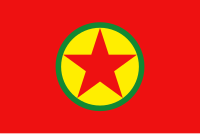Kongra-Gel
|
Kurdistan Workers' Party
Partiya Karkerên Kurdistanê (PKK) |
|
|---|---|
 |
|
| Leader |
Abdullah Öcalan (de jure) Cemil Bayık (de facto) |
| Founded | 1978 |
| Headquarters | Qandil Mountains |
| Paramilitary wing |
People's Defence Forces (HPG) Free Women's Units (YJA-STAR) |
| Ideology |
Kurdish nationalism Libertarian socialism Libertarian municipalism Democratic confederalism Communalism |
| National affiliation | Peoples' United Revolutionary Movement |
| International affiliation | Kurdistan Communities Union (KCK) |
| Website | |
| www |
|
| People's Defence Forces Hêzên Parastina Gel (HPG) |
|
|---|---|
 |
|
| Leader(s) | |
| Foundation | 1984 |
| Dates of operation | 1984–present |
| Motives | Cultural & political rights for the Kurdish population in Turkey. |
| Active region(s) | Turkey, Iraq, Syria, Iran |
| Ideology |
Socialism Democratic confederalism Communalism |
| Notable attacks |
1984 PKK attacks May 24, 1993 PKK ambush 2011 Hakkâri attack |
| Status | Fighting against ISIL.Ongoing war with Turkey, after ceasefire ended. |
| Size | Over 32,800 active fighters (2015 Turkish claim) |
| Website | www |
| Free Women's Units Yekîneyên Jinên Azad ên Star (YJA-STAR) |
|
|---|---|
 |
|
| Dates of operation | 1984–present |
| Active region(s) | Turkey, Iraq, Syria, Iran |
| Ideology |
Democratic confederalism Socialism Communalism |
| Status | Fighting against ISIL.Ongoing war with Turkey, after ceasefire ended. |
| Website | www |
The Kurdistan Workers' Party or PKK (Kurdish: Partiya Karkerên Kurdistanê) is a left-wing organization based in Turkey and Iraq. Since 1984 the PKK has waged an armed struggle against the Turkish state for equal rights and self-determination for the Kurds in Turkey, who comprise between 18% and 25% of the population and have been subjected to repression for decades.
The group was founded in 1978 in the village of Fis (near Lice) by a group of Kurdish students led by Abdullah Öcalan. The PKK's ideology was originally a fusion of revolutionary socialism and Kurdish nationalism, seeking the foundation of an independent, Marxist–Leninist state in the region, which was to be known as Kurdistan.
However, since his capture and imprisonment in 1999, the leader of the PKK, Abdullah Öcalan, has completely abandoned Marxism–Leninism, leading the party to adopt his new political platform of "Democratic Confederalism" (influenced strongly by the libertarian socialist philosophy of communalism) while ceasing its official calls for the establishment of a fully independent country. In May 2007, former members of the PKK helped form the Kurdistan Communities Union (KCK), an umbrella organisation of Kurds from Turkey, Iran, Iraq, and Syria. On 20 March 2005, Öcalan described the need for a democratic confederalism and went on to say:
...
Wikipedia
